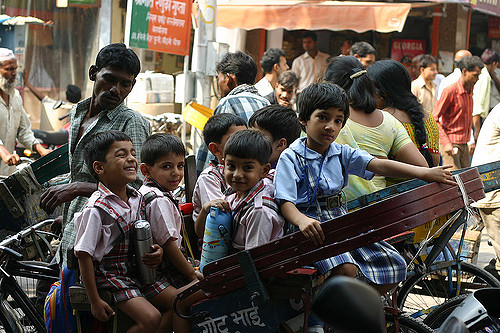- About
- Topics
- Picks
- Audio
- Story
- In-Depth
- Opinion
- News
- Donate
- Signup for our newsletterOur Editors' Best Picks.Send
Read, Debate: Engage.
| topic: | Child rights |
|---|---|
| located: | India |
| editor: | Tish Sanghera |
Last week, India passed a regrettable milestone - for over 500 days, since 24 March 2020, millions of its children have not stepped foot in a school.
Though restaurants, shopping malls, cinemas and more such public spaces have been allowed to re-open, the government has been reluctant to send children back into schools. Misguided fears that young people are particularly susceptible to Covid-19 appear to be behind the decision and has left many perplexed.
While kids around the world have been swapping whiteboards for laptops, switching to remote learning has been largely unfeasible for most children from India's under-resourced, government schools. Though many teachers around the country have made herculean efforts to share classes and grade homework over WhatsApp, the ubiquitous and dominant messaging platform in India, many families do not have a smartphone at home, let alone a laptop or internet connection.
Even if children can borrow a parent's smartphone for a couple of hours a day, parents have noticed that after a while children find it hard to concentrate and that staring at the tiny screen becomes a wholly un-engaging way to learn. As a result, a recent survey of daily-wage workers and those earning the least in cities like Lucknow and Pune, found 95 percent of respondents children had dropped out of school.
Such a prolonged absence from formal learning has experts worried. A recent study found that out of the children researchers surveyed, 82 percent had lost a math ability and 92 percent a language ability.
Spending over a year and a half away from school can also have devastating social consequences. As children stay at home, they can also begin carrying out more of the daily household chores, perhaps even joining the parents in looking for casual labour or domestic work.
There is therefore a real danger that even when schools do re-open, many may not return, says a recent report by UNICEF. Furthermore, as the employment rate continues to be battered by the pandemic, many children are becoming essential breadwinners for entire families. Child marriage rates are also on the up and are another reason why girls may not go back to school - as economic pressures mount, so do the pressures to release a mouth to feed.
Getting kids back into school should be an immediate priority of the central and state governments. That children are sliding back into illiteracy should be a huge incentive, let alone the millions missing out on the vital mid-day meal service, which previously served them often their only square meal of the day.
Image: MChe Lee.

